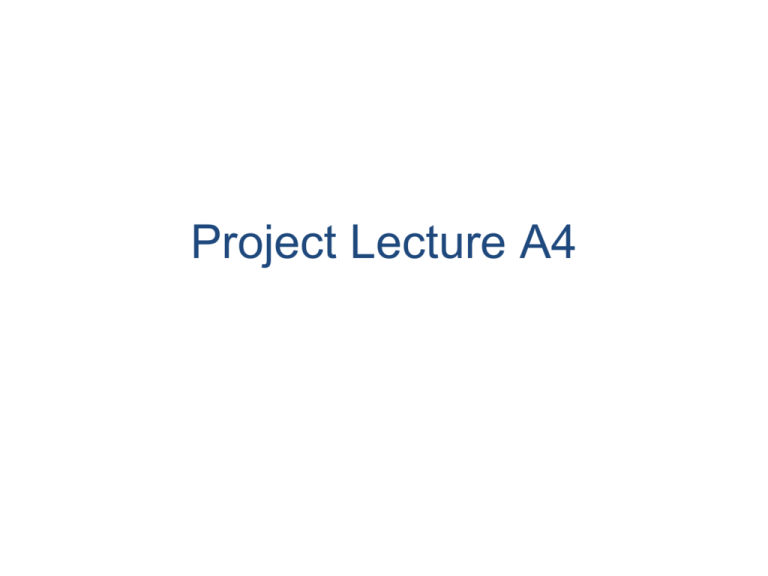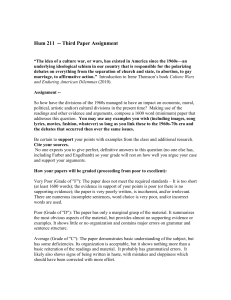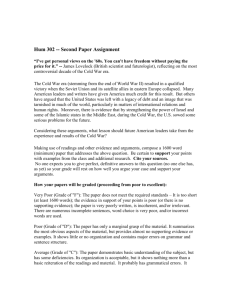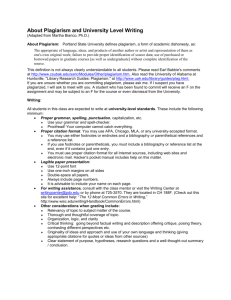Lect 4
advertisement

Project Lecture A4 Using the literature legitimately and well Literature search, management + literature review Referencing Notes towards writing up Why is a literature review important? • It justifies your project – shows it is worth doing • It sets your project within context by looking at research in the project area • It helps to refine your project idea • It identifies research methods and strategies which you could use • It helps you avoid repeating the work of others • Basis for further reading, as your project develops • Distinguishes your work as an academic project Doing a literature review • Literature search – “A systematic gathering of published information relating to a subject” University of Derby, 1995 – Start broad, then focus – Includes information management • Literature review – Read the literature – Critically evaluate what you have found • More than one iteration – continue through life of project Literature search • Start with broad focus: identify topics of interest to provide a starting point – At this stage: use subjective understanding, student text books, interest publications • Narrow the focus: – focus on key authors, specific journals (identify from reading lists), identify key themes • Redefine/refine search – Continuous cycle – identify different thinking in the area, understand which material to include/exclude, Searching for literature 1 • Choose keywords relating to the branch of computer science you are in • Try different keyword phrases • Assess quality of what you are pointed to (library has a link to Internet Detective) Stages Activities Documentation Quality Project mgt Communications Analysis Synthesis Operations Retirement Software engineering Models Support elements Methods Techniques Standards ISO 9000 ISO 9126 Dawson (2005) MS Project Quality mgt system Documentation system TQM Waterfall Spiral Prototyping SSADM SSM JSP DFD OOD Prototyping Tools Processes Evolutionary Throw away Incremental Experimental Rapid Artificial Intelligence Application areas AI techniques Search techniques Machine learning Expert systems Mundane tasks Expert tasks Planning Pattern recognition Vision Robotics Image processing Dawson (2005) Medical diagnosis Prediction Knowledge representation Semantic networks Rulebased systems Philosophical issues Frames Predicate logic Sources of literature Source Where to find them Useful means of finding sources Books University library; public Bibliographic databases; library; own collection reading lists Papers in journals University library; interlibrary loan On-line documents WWW pages; FTP archives Bibliographic databases; lists of references in other papers WWW search engines Features of literature search • Systematic • Published – i.e. recognised, refereed • Is something worth reading? – – – – Title, contents list, index – are keywords relevant? Author recognised in field? Book up to date, latest edition? References include citations of other key works, can use them? – Written at appropriate level? (technical, introductory, review, discussion) Searching for literature 2 • Read recognised leaders and original theorists in your field • Use lists of references in things you read • Citation indexes are a measure of quality • KEEP NOTES – bibliographic information (citation) – saves you time – notes on contents – precis as you read Quality of what you read Good indications: + In a refereed journal + Widely-read source + Author is well known and respected + Referred to by other sources Bad indications: - Self-published or unpublished work - In an obscure publication - You wouldn't know the author from Adam - Does not refer to other published work Active reading • Look at the title of the passage/article • Look at contents list (if present)/ paragraph headings – structure • Look at index- does your item have lots of entries? • Is there an abstract? • Flick through and note main points that catch your eye • Then settle down to read through (Cottrell (2001)) Managing your information • Be strategic – decide what you know already and what direction you want to go • Be focused – don’t acquire a mass of material you can’t digest • Use mind mapping to – identify topics of interest and how they link together – sort what you have found and… • Housekeeping: – Keep references electronically (EndNote) – Set up an index system • Note quotes and use to support arguments rather than give new ideas • Know when to stop Critical evaluation of literature 1 • Critical evaluation: – Goes beyond description by development judgement, responding to what has been written – Relates different writings to each other – Does not take what is written at face value – Sees research as area where different views and positions may be made (Blaxter (2001)) Critical evaluation of literature 2 • What type of article is it? up to date? • How does the article fit within its context? support your project? • Are the arguments made logical? supported or contradicted by others? applicable only in certain cases? • Does the article support the status quo or contradict other viewpoints? • Fact or opinion? • Do you agree? counterarguments? • Is research design, methodology, results, conclusions etc valid? • Use of references? 2. Literature review • Reader needs: – context by which to read your report – background to be able to tell whether your approach was valid or best • What has been written: – about your problem? – about solutions which have been proposed, how successful they were? • Be relevant and explain how and why it is – use examples to illustrate important points – be “critical” in the positive sense of the word – if authors say different things, make a judgement • Remember audience is academic – no palaeontology How to write up a project 18 What a literature review is not… • Not a report listing all the reading you have done whether it is relevant or not – be selective • Not a paragraph about each article, reporting on content, without critiquing or linking to your main discussion Suggested review approaches • Explain about area of study: general review of area, concentrating on academic literature • Try and tell a story, supported by your references • Present arguments and counter-arguments • Alternative theories and methods and explanation why they are relevant Other possible strategies • Show how topic has evolved, but beware paleontology • Focus more precisely and discuss some recent developments in the field • Criteria / reasons for choice of methods • Short overview of relevant technologies Writing the literature review - summary • Identifies relevant literature in your field • Refers to past and present articles, commenting on omissions and biases • References support your arguments where appropriate • Shows where your project topic fits into the field • http://dissertations.port.ac.uk What is plagiarism? • Plagiarism is passing off an idea as your own • For every idea, decide: – Is it your own? (reading will help ensure this) – Is it common knowledge (multiple sources)? – Does it have one source (or a small number)? – then it needs a reference • You must acknowledge other people’s ideas • Three failures in 2003-2004 due to plagiarism; three in 2004-2005, four in 2005-2006, two in 2006-2007 • Project mark reduced to 0 if plagiarism is detected Plagiarism gets in the way of your creativity: your specific voice. • Why do people plagiarise? – lack of time – lack of confidence – lack of understanding • Plagiarism of ideas • Much is unintentional (but still guilty) – intent is not an issue • Poor scholarship – no/sloppy citing, evidently different work, not malicious How to avoid plagiarism • Identify words: – Quotation marks or similar (legal but poor scholarship) – Jim Briggs states that … – As Checkland describes, … – Name names! – Paraphrasing in your own words shows you understand • Identify source: – Conventional way is to include a bibliographic citation next to idea in your report [Briggs98] – How to do it? See http://www.pums.cam.port.ac.uk /projects/docs/projcite.htm Anti-plagiarism resources • PUMS info – http://www.pums.cam.port.ac.uk /projects/docs/projcite.htm • • • A good example! – http://www.tech.port.ac.uk/staffw eb/briggsj/SENG2/reuse.htm • Turnitin software • http://www.fsu.edu/~crimdo/class. html - Cecil Greek in Florida http://www.uwo.ca/geog/undergra duate/essay_guide/definiti.htm University of Western Ontario http://fbox.vt.edu:10021/studentinf o/gradhonor/ghsconst.html#app3a - Virginia Polytechnic Institute Starting to write A suggested technique • Start with something concrete – your requirements analysis, design, implementation • Move on to literature review (from your notes and conceptual models) • Finish with introduction and conclusion, where you are writing at a more abstract level






